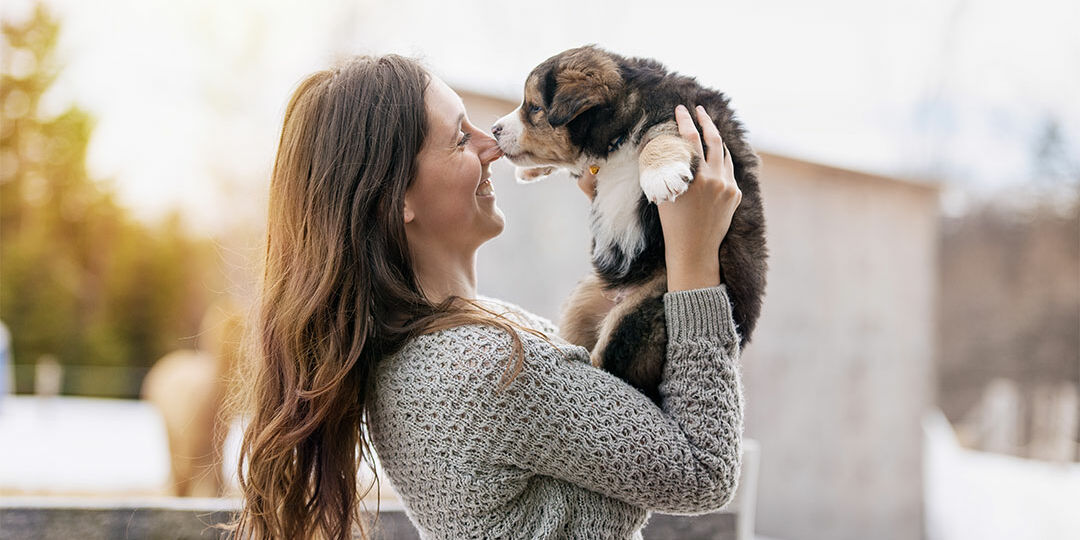
Paw-some Tips for a Healthy, Happy Puppy
Get ready for an overload of cuteness because it’s National Puppy Day! Established in 2006, National Puppy Day celebrates man’s best friend and all the unconditional love we have to show them. While we love seeing all the cute pics of our fav four-legged friends from around the nation, this day is also to help bring awareness around the dangers of puppy mills and help bring attention to prospective pet owners who are considering adopting. In order to celebrate a new furry friend potentially being added to your family, we’ve rounded up some paw-some tips to make sure you help raise a healthy, happy puppy. Check them out below!
1. Provide a Balanced Diet
Nutrition is such a key element to making sure your puppy is getting all the nutrients they need to grow. Focus on feeding them high-quality puppy food that meets their nutritional needs. Be sure to try and avoid feeding them table scraps or human food that can be harmful to their health.
2. Ensure Proper Hydration
Besides food, getting enough water is critical for pups of any age, particularly puppies. Water facilitates the metabolic processes (i.e., everything from digestion to brain activity) and as it flows through your puppy’s body, it clears out harmful toxins and transport oxygen. Without it, their vital organs can suffer. To help mitigate dehydration in your puppy, ensure that your puppy has access to clean, fresh water at all times.
3. Get Regular Check Ups
Schedule regular visits to the vet to ensure that your puppy is healthy and up to date on all vaccinations. Getting their vaccinations can help prevent them from catching major illnesses from other dogs they may encounter. Plus, by seeing a vet regularly, you’ll be able to keep a consistent eye on your dog’s overall health and well-being.
4. Exercise Regularly
Puppies have lots of energy, and regular exercise can help them burn it off. As a general rule of thumb, the average puppy who is growing could/should do about 5 minutes of physical exercise for every month of their age, once or twice. Day. For example, a puppy who is 5 months old should generally do about 25 minutes of exercise, twice a day. Try and take them for walks or play games with them to keep them active and happy. But make sure you’re not overdoing it! Learn to read your pup’s signs. If they’re tired, let them rest. You don’t want to push them to do activity when they really don’t want to.
5. Provide a Safe Environment
Puppies are busy creatures and tend to be nosy in nature, just like toddlers! To help keep your puppy safe, you’ll want to take preventative steps by puppy-proofing your home and yard. Remove any potential hazards, such as small objects or toxic substances. For further details on potentially dangerous substances and items, check out the FDA and/or the American Animal Hospital Association.
6. Socialize Your Pup
Puppy socialization is a critical factor in ensuring your dog is a well-natured animal. Once they have their vaccinations, try to introduce your puppy to other dogs and people to help them develop social skills and reduce the risk of behavioral problems. Doggy daycares and puppy obedience classes are also a great way to help your dog mingle with other pups.
7. Prioritize Training
While training never really stops, starting young can really help you and your dog establish a routine. Right from the get-go, training your puppy will help establish good behavior and obedience. Try using positive reinforcement techniques, such as treats and praise, to encourage good behavior. Not sure where to start? Look for local puppy obedience classes in-person or online to help you build a solid foundation.
8. Provide Mental Stimulation
Just like physical exercise, your puppy needs a daily brain workout too! Puppies need mental stimulation to keep them happy and engaged. If they’re bored, that’s when they start to cause trouble like eating things they shouldn’t and destroying furniture. Try providing them with toys and puzzles that challenge their minds. This will assist in processes like memory and problem-solving.
9. Groom Regularly
Proper grooming is more than just keeping your pet looking fresh. It’s also about tackling potentially unhealthy skin conditions and ticks. Make sure you’re keeping your puppy clean and well-groomed by bathing them regularly, trimming their nails, and brushing their coat.
10. Give Ample Love & Attention
Getting a puppy is no easy task and shouldn’t be taken lightly. It’s a commitment and requires a lot of work – to your dog, you are everything. Make sure you’re show your puppy lots of love and attention to help them feel happy and secure. Spending quality time with them, petting them, and giving them praise and affection will help create a bond between you and your pup that is like no other!
Nutrition and proper mental stimulation are key with puppies! Check out these easy dog treats you can make at home or these 5 brain games for your pup.
